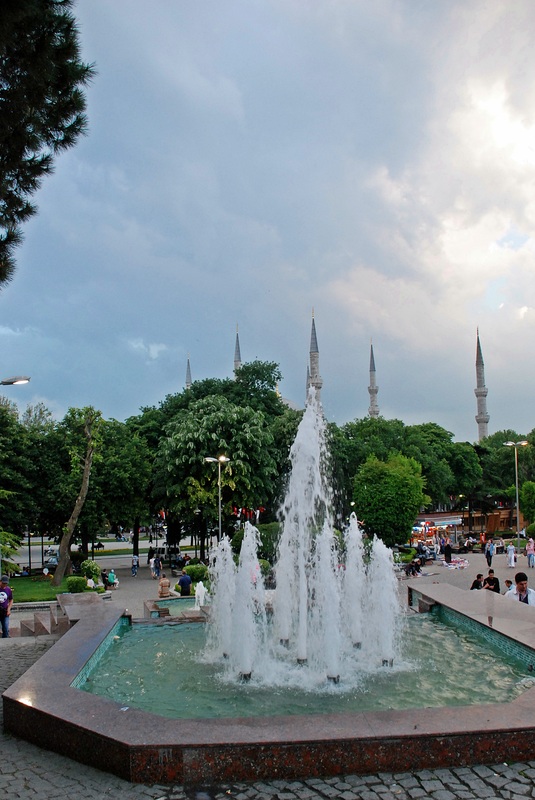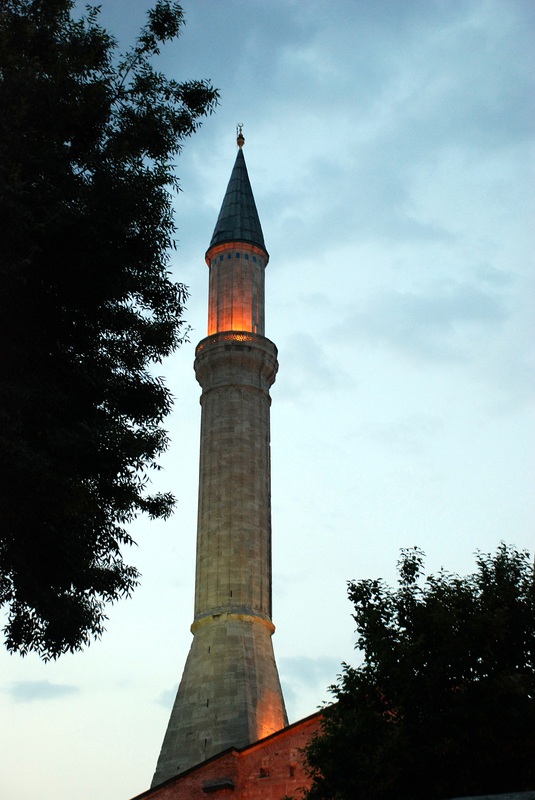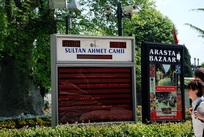
Good advice is worth its weight in gold. When I decided to go to Turkey, I called my friend, Carla. She and her husband are seasoned travelers and have been to Turkey a number of times. And she knows me well enough to know some of my weak spots.
The first thing she warned me about are the touts. And what she said was, 'Don't give the touts any face.'
What? Don't give any what to the who?
Touts are a nasty cross between a used car salesman, one of those obnoxious jerks who hawk cell phones from kiosks in the mall, and carnival barkers.
They are paid to get you to go with them to a restaurant or carpet store or other tourist trap that they claim to own. They then use every high-pressure tactic in the book to get you to overspend on something you didn't really want anyway.
My first encounter with them brought to mind every bit of research I've done on con-men over the years (yes, I have strange interests, I know.)
A con-man finds his victims by asking you for something that is out of line, but small. When you comply, the requests get a little bigger and over time, you suddenly find you've done the equivalent of sending your confidential bank information to that
nice prince from Nigeria.
Con-men are basically playing a numbers game, they approach everyone and keep pushing on the ones who are most compliant.
Carla gave me very clear warnings about the touts and their attempts to use your own sense of polite
conduct and 'niceness' against you. She told me to forget about being a Southern lady.
A Turkish woman would never respond to a strange man who approached her on the street and so within the Turkish culture they are considered rude, to say the least.
By telling me not to 'give face', She recommended that I keep my face very still and not respond by word or gesture to ANYTHING that a strange man on the street said to me. She said to keep very cold and formal, no matter how uncomfortable it is to do so.
And boy, was she right. These guys are mostly young, good-looking and sharply-dressed. They stand outside of restaurants and shops in the tourist district and in the high rent/high traffic sections of the Grand Bazaar. and urge you inside.
Those guys are not too bad, mostly. It's the guys in front of the mosque that are trouble because if you acknowledge in any way that they exist, they will follow you for blocks.
The Blue Mosque and the Hagia Sophia are on opposite sides of a huge square.
The first thing she warned me about are the touts. And what she said was, 'Don't give the touts any face.'
What? Don't give any what to the who?
Touts are a nasty cross between a used car salesman, one of those obnoxious jerks who hawk cell phones from kiosks in the mall, and carnival barkers.
They are paid to get you to go with them to a restaurant or carpet store or other tourist trap that they claim to own. They then use every high-pressure tactic in the book to get you to overspend on something you didn't really want anyway.
My first encounter with them brought to mind every bit of research I've done on con-men over the years (yes, I have strange interests, I know.)
A con-man finds his victims by asking you for something that is out of line, but small. When you comply, the requests get a little bigger and over time, you suddenly find you've done the equivalent of sending your confidential bank information to that
nice prince from Nigeria.
Con-men are basically playing a numbers game, they approach everyone and keep pushing on the ones who are most compliant.
Carla gave me very clear warnings about the touts and their attempts to use your own sense of polite
conduct and 'niceness' against you. She told me to forget about being a Southern lady.
A Turkish woman would never respond to a strange man who approached her on the street and so within the Turkish culture they are considered rude, to say the least.
By telling me not to 'give face', She recommended that I keep my face very still and not respond by word or gesture to ANYTHING that a strange man on the street said to me. She said to keep very cold and formal, no matter how uncomfortable it is to do so.
And boy, was she right. These guys are mostly young, good-looking and sharply-dressed. They stand outside of restaurants and shops in the tourist district and in the high rent/high traffic sections of the Grand Bazaar. and urge you inside.
Those guys are not too bad, mostly. It's the guys in front of the mosque that are trouble because if you acknowledge in any way that they exist, they will follow you for blocks.
The Blue Mosque and the Hagia Sophia are on opposite sides of a huge square.
The initial approach:
'You are looking for Blue Mosque? I will show
you, here it is."
'You are looking for Blue Mosque? I will show
you, here it is."

No kidding, dude, it's huge and it's right here.
"Where are you from?"
"Why won't you talk to me, aren't you nice?"
Um, no, actually. Because I know you aren't either.
If you haven't responded by this time, the whole thing starts over in another language. [It became a game to count the number of guesses. When they guessed Turkish or Arabic, I was proud. When they guessed Finnish, I was just confused.]
These guys aren't physically dangerous, they are just obnoxious and will waste your time and try to get you to overpay. And I am stubborn by nature.
I also read a post by a Turkish woman in a travel forum that mentioned that one of the dead giveaways that you are American is that you smile too much. And today I really learned how right that is. I caught myself flashing a smile at the beginning of every interaction.
In the US, the quick smile signals a greeting, it is considered polite. In Turkey, if a woman smiles at a strange man she is overtly expressing interest. I ran into a similar issue about prolonged eye contact when I moved from Georgia to New Mexico for college.
Suddenly, all the stories I had heard about single female travelers being accosted by men who would not leave them alone made a little more sense. It doesn't make sexual harassment right, but it does make me feel better about having clear and firm boundaries from the beginning.
So I spent much of the day discovering and trying to control my typically American gestures and facial expressions.
In Turkey, the head is nodded forward for 'yes' and nodded backward for 'no'. Shaking the head side to side is for confusion. So when I was approached by touts and instinctively shook my head at them, they said, "Oh, you are an American" and tried to follow me.
I discovered pretty quickly that I need to adopt a posture and facial expression that is decidedly unfriendly by American standards but it kept the
worst of the touts away or made them give up fairly quickly.
I saw other American tourists happily chatting with touts leading them away to be fleeced and I had to fight the urge to 'save' them.
[The Turkish woman's post also made an interesting point about relative formality. Interactions in Turkey between a man and a woman who are strangers is significantly more formal than in the United States and stays formal through the course of more interactions.]
[So it makes sense that being overly familiar or casual could make the mannerly Turkish men very uncomfortable. So I spent the first few weeks trying to find a balance of appropriate formality and appropriate courtesy. Considering how little Turkish I speak, I definitely didn't get it right all the time, but I did try. And no man every truly harassed me or followed me for more than half a block.]
.
"Why won't you talk to me, aren't you nice?"
Um, no, actually. Because I know you aren't either.
If you haven't responded by this time, the whole thing starts over in another language. [It became a game to count the number of guesses. When they guessed Turkish or Arabic, I was proud. When they guessed Finnish, I was just confused.]
These guys aren't physically dangerous, they are just obnoxious and will waste your time and try to get you to overpay. And I am stubborn by nature.
I also read a post by a Turkish woman in a travel forum that mentioned that one of the dead giveaways that you are American is that you smile too much. And today I really learned how right that is. I caught myself flashing a smile at the beginning of every interaction.
In the US, the quick smile signals a greeting, it is considered polite. In Turkey, if a woman smiles at a strange man she is overtly expressing interest. I ran into a similar issue about prolonged eye contact when I moved from Georgia to New Mexico for college.
Suddenly, all the stories I had heard about single female travelers being accosted by men who would not leave them alone made a little more sense. It doesn't make sexual harassment right, but it does make me feel better about having clear and firm boundaries from the beginning.
So I spent much of the day discovering and trying to control my typically American gestures and facial expressions.
In Turkey, the head is nodded forward for 'yes' and nodded backward for 'no'. Shaking the head side to side is for confusion. So when I was approached by touts and instinctively shook my head at them, they said, "Oh, you are an American" and tried to follow me.
I discovered pretty quickly that I need to adopt a posture and facial expression that is decidedly unfriendly by American standards but it kept the
worst of the touts away or made them give up fairly quickly.
I saw other American tourists happily chatting with touts leading them away to be fleeced and I had to fight the urge to 'save' them.
[The Turkish woman's post also made an interesting point about relative formality. Interactions in Turkey between a man and a woman who are strangers is significantly more formal than in the United States and stays formal through the course of more interactions.]
[So it makes sense that being overly familiar or casual could make the mannerly Turkish men very uncomfortable. So I spent the first few weeks trying to find a balance of appropriate formality and appropriate courtesy. Considering how little Turkish I speak, I definitely didn't get it right all the time, but I did try. And no man every truly harassed me or followed me for more than half a block.]
.



 RSS Feed
RSS Feed
